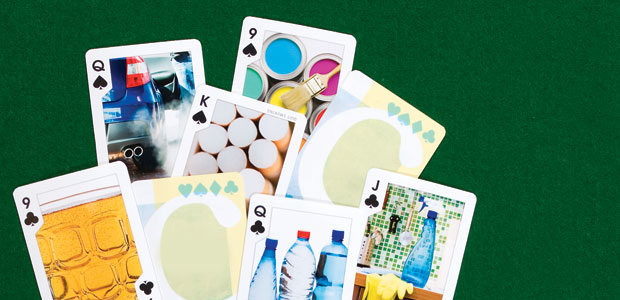Advertisement
Deal Out Cancer
Play your cards right

Perhaps no other illness strikes as much fear in people as cancer. According to the Canadian Cancer Society, about 40 percent of women and nearly 45 percent of men in this country will face a personal battle with this fearful disease. While there aren’t any guarantees when it comes to keeping the disease at bay, there are scores of strategies to help prevent it.
Eat Well
One of the simplest steps we can take to reduce the risk of cancer is to make wholesome food choices. Vancouver registered dietician Ali Chernoff says that a healthy diet is crucial in the fight against cancer, along with not smoking and maintaining a healthy body weight.
“Everything is so processed these days that meals end up being nutrient-deprived,” Chernoff says, noting that a diet high in red meat, processed meat, and saturated fat has been linked to an increased cancer risk.
According to the Public Health Agency of Canada, at least 20 percent of cancer deaths are linked to a poor diet, including the consumption of alcohol. The Canadian Cancer Society says that 30 to 35 percent of all cancers could be prevented by a combination of eating well, being active, and watching our weight.
“Eat your veggies and your fruits, because the antioxidants they contain may protect you,” Chernoff says, pointing to kiwi fruit, strawberries, broccoli, bell peppers, papaya, sweet potatoes, pink grapefruit, guava, watermelon, carrots, spinach,and oranges.
Also crucial are whole grains, which are high in fibre. They’re a source of selenium, which protects cells from oxidation and helps boost the immune system. Think beyond whole wheat bread, Chernoff notes, and explore ancient grains such as spelt, quinoa, bulgur, and millet.
“Skip the alcohol, or at least cut back to a few per week and not on the same day,” she adds.Leslie Beck links diet to the prevention of illness in Foods That Fight Disease: A Nutrition Guide to Staying Healthy for Life (Penguin, 2008). Along with sharing recipes, the Toronto nutritionist gives advice on vitamins and minerals that could protect against cancer.
Vitamins A and C may protect against lung cancer, for instance, and folate might guard against colon cancer. Vitamin D could reduce the risk of breast, colon, and prostate cancers,while vitamin E might help prevent prostate cancer.
Cover Your Bases
Making healthy food choices is just one way to help reduce the risk of cancer, and there are many others. Vancouver naturopath Walter Lemmo specializes in treating people with cancer, integrating complementary and conventional medicine. To combat the disease, he says to start with the basics: don’t smoke, reduce the amount of fat around your belly, and exercise regularly.
Exercise
“Get outside and get active,” Lemmo says. “Even walking for a few hours a week helps; the key is consistency. If you do it for two weeks then stop for four months, it isn’t going to help.”
Checkups
The value of testing can’t be stressed enough, he says. “Mammograms, colonoscopies, prostate screening: it’s really important to do these things,” he tells alive. “Catching it early is always the best.”
Fion Chou, a traditional Chinese medicine (TCM) practitioner, agrees it’s vital to be vigilant. She says people should see a health professional on a regular basis, whether it’s a TCM doctor, a naturopath, a general physician, a homeopath—whichever type of practitioner people believe in and feel comfortable with.
“It doesn’t mean going once a week or once a month, but to see how you are doing every three or four months,” explains Chou, who founded the Divine Health Clinic. “Check in to see what’s happening with you.”
Inflammation is another red flag, Lemmo says, noting that blood tests can be done to test a person’s “inflammatory load,” or level of c-reactive protein (CRP). Although the test for CRP, which is produced by the liver, isn’t specific enough to diagnose a disease, it’s a marker for systemic inflammation, and elevated levels can indicate the need for further testing.
The link between inflammation and cancer came to light in 2004, when Celebrex, an arthritis drug, was found to lower the risk of developing polyps that lead to colon cancer. (The drug also increases the risk of heart disease.) The painkillers are a type of cox-2 inhibitor, which seem to block a substance that causes inflammation and is also found in many tumours.
Supplements
Lemmo also encourages people to consider supplementing with vitamin D, based on the research supporting its role in preventing cancer.
A 2007 study published in the American Journal of Clinical Nutrition found that the higher the levels of vitamin D in the blood of postmenopausal women, the lower the risk of developing cancer. Another study found that women who consume more calcium and vitamin D than others may be less likely to develop breast cancer before menopause.
“The Canadian Cancer Society recommends at least 1,000 international units [of vitamin D per day]; I recommend about 2,000 international units,” Lemmo says, adding that people can also get the sunshine vitamin by spending at least 20 minutes outside each day. Just be careful not to get burned, as long-term exposure to UV rays increases the risk of skin cancers.
Massage
While some people rely on supplements to ward off cancer, others swear by lymphatic drainage through rhythmic, gentle massage.
One of the lymphatic system’s functions is to remove waste from the body’s tissues. However, lymph fluid can build up in the space between cells and cause swelling, sometimes ultimately leading to disease. Through massage, excess lymphatic fluid can be moved away from the congested area.
“The lymph system drains toxins out of the body,” explains registered massage therapist Susan Stewart Griffin. “It’s a really important part of wellness … the lymph glands can get blocked; massage can improve the flow of toxins out of the body,” Stewart Griffin claims.
Plus, it also induces relaxation.
Breathing
People need to watch their overall well-being and all their stress and strain,” Lemmo says. An easy way to diminish stress is to “breathe 200 times consciously” every day. “We sometimes forget how to breathe, so we breathe out of our chests and not our diaphragms.
“See friends, laugh, and share some good stories,” Lemmo adds. “When we are stressed and strained, we can become more immune-suppressed.”
Chou also sees stress as having a tremendous impact on the immune system.
“When we say we are under stress, that prevents the energy, or chi, from flowing freely in the body,” Chou says. “When that chi is not flowing smoothly, blood circulation becomes blocked, and blood becomes stagnant.”
Acupuncture
Much of the focus of TCM, Chou explains, is maintaining health. One of the ways the ancient medical system prevents disease is through acupuncture. Practitioners use needles to stimulate points along meridians, which are believed to be the pathways along which chi flows through the body. If the movement of chi is obstructed, the body may be more susceptible to disease.
Balance
“Disease comes from imbalances in the body,” Chou says, noting that anything that reduces stress can also help decrease a person’s risk of acquiring cancer, whether it’s being in nature, doing yoga, getting regular exercise, or even making major life changes.
“If you’re dragging yourself to work, filled with dread, that’s a sign you have to do something: maybe you need to see a counsellor, change your attitude, or change your job altogether,” Chou says.
Meditation
That cancer is linked to stress is a prevailing view among many natural health practitioners.
YYoga’s director of learning and development, the single-monikered Padma (formerly Marla Stewart), says it’s vital to relieve tension through such practices as meditation.
“There are so many techniques to take you into stillness,” Padma explains. “It [meditation] counteracts stress, because it’s really effective at calming down the body and the mind. A chronic state of stress, when there’s no relief, leads the body’s cells to be bathed in fear and anxiety, and that directly affects physical health.
“If you can take a step back to be watchful, to take your mind to a state of awareness which is positive, affirmative, strong and healthy … it replenishes your immune system.”
Reflexology
Some stress, of course, is healthy in itself: in manageable doses, it can be a great motivator. “But when we encounter circumstances or situations we can’t intellectually, psychologically, or emotionally deal with, we suppress, repress, or deny it,” says Chris Shirley, founder of the Pacific Institute of Reflexology. “Stress doesn’t go away; it is stored in the subconscious mind and locked in the body.”
Clearly, reflexology itself won’t prevent cancer, but Shirley says it’s just one more tool in the arsenal against disease.
“Reflexology contributes to natural healing in that it reduces stress,” he says. “Everything works fine until stress—whether it’s emotional, psychological, or physical—starts to interfere with the natural, vibrant, healthy functioning of the body.”
The world around us
Just as important as your inner well being in cancer prevention are your surroundings. Reducing your exposure to cancer-causing substances is vital, according to Mae Burrows, executive director of Toxic Free Canada.
Some toxins are hard to avoid. “The level of diesel fumes is a real tough one to do something about,” Burrows says. “But it’s a known human carcinogen.”
Other harmful substances are easier to steer clear of. Take formaldehyde: another known human carcinogen, it’s found in such products as nail polish, cosmetics, paints, and glues, Burrows says.
“We need to be careful about products at home, especially around young children and teenagers,” she explains.
The Canadian Cancer Society claims that the number of cancer cases that can be directly linked to environmental causes is unknown, but that people who are continually exposed to cancer causing substances may have a higher risk of developing cancers.”
Burrows applauds Health Canada’s decision to ban bisphenol A from baby bottles but says the government didn’t go far enough: the carcinogenic substance is still used in water bottles.
“If there’s evidence of risk of something being toxic, from animal studies or lab studies, we should take the precautionary approach and avoid them. We can err on the side of caution.”
The role of geneTics Of course, genetics play a role in the development of cancer as well. And sometimes people with no family history of the disease do everything right—they eat their veggies, exercise, don’t smoke, and do yoga—and they still acquire the disease. They mustn’t be made to feel responsible for getting sick. Nevertheless, doing as much as you can to live a healthy life certainly can’t hurt. “We’re born with a certain deck of cards,” Lemmo says. It’s up to us to decide how we play them.
Toxic chemicals in our homes
Formerly the Labour Environmental Alliance Society, Toxic Free Canada publishes CancerSmart: The Consumer Guide, which outlines what toxic chemicals are found in everyday products. Some of these include:
| Toxic chemical | Health concern | Found in |
| silica | known carcinogen suspected of being toxic to the gastrointestinal tract, liver, kidney, and respiratory system | abrasive cleaners |
| 2-butoxyethanol | may cause blood disorders and liver and kidney damage; may also cause reproductive damage on long term exposure | carpet cleaners and specialty cleaners |
| phthalates | endocrine disruptors | children’s toys and plastic wraps |
Disease Busters
In Foods That Fight Cancer: Preventing Cancer through Diet (McClelland & Stewart, 2006), researchers Richard Béliveau and Denis Gingras delve into disease-busting foods:
- Vegetables from the cabbage family
- Garlic
- Onions
- Soybeans
- Turmeric
- Green tea
- Berries
- Tomatoes
- Citrus fruit
- Red wine
- Dark chocolate
- Sardines
- Mackerel
- Salmon
- Flaxseeds
- Soy
- Nuts
Foods to avoid
In a nutshell: anything marinated, smoked, fried, or processed.





